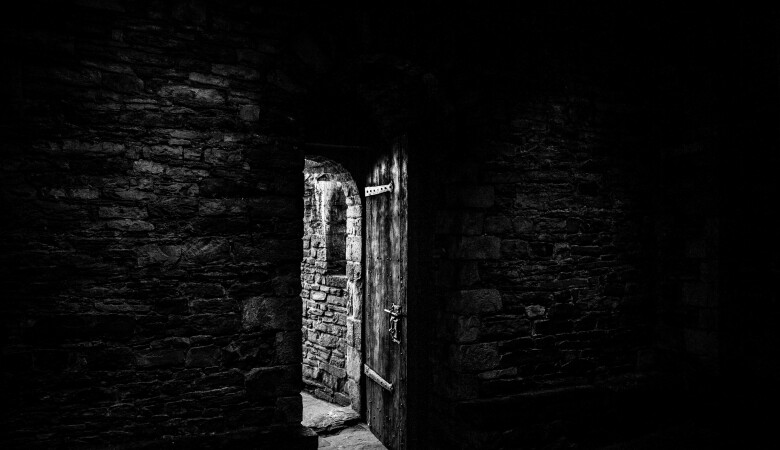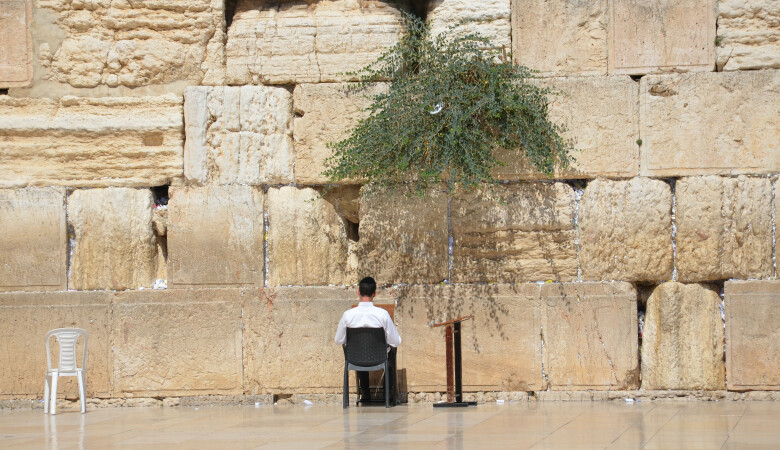Series: Mark
Christ Begins to Build His Kingdom (Mark Sermon 3)
January 23, 2022 | Andy Davis
Mark 1:12-20
The Kingdom of Christ
In Mark 1, we see Jesus begin to build his kingdom of light as he overcomes temptation, preaches the good news, and calls people to follow him.
- SERMON TRANSCRIPT -
We continue in our study of this incredible gospel of Mark. And for me, as a lover of history, it's fascinating to see how the greatest empires of the world got their start. How they were built. Alexander the Great was 21 years old when his father or Phillip of Macedon, died. And he immediately seized that moment by assassinating his two most powerful rivals, and then building a coalition of city-states into a massive Greek army, and then going east to topple the Persian empire. He moved out with such decisiveness and ruthlessness, and rapidity that the book of Daniel likens him to a leopard with four wings or to a beast that moves across the earth without even touching the ground. Ruthlessness and speed, Alexander the Great.
Then there's Julius Caesar, who used political cunning and strategic marriages to aristocratic women to angle himself and position himself so that he could become the head of a powerful army of Roman legions, then used his military genius to conquer Gaul, which is modern-day France in nine years. He trains his soldiers personally with meticulous care, the care of a skilled craftsman. And then he led from the front boldly and courageously. And again, we see the same thing, relentless ambition, ruthlessness, and power.
Then there's Genghis Khan, much the same. Clever, ruthless, and treacherous, built together a band of waring tribes into a massive world-conquering force after his first battle against the Tatars. He slaughtered everyone who was taller than an axle wheel. This is the kind of ruthlessness with which these world conquers build their kingdom.
Now Jesus Christ is the King of Kings and the Lord of Lords. And it is true that his kingdom conquers all enemies and extends, and the end will extend to the ends of the earth and will last for all time. But his manner of building his empire is very different. Very different than what all of these world conquerors have done. Now, the power of Jesus Christ is absolute. There's no one in this room that has a full sense of the magnitude of Jesus' power. His omnipotence. No one could have stood before him. Demons knew it, and they trembled before him and instantly obeyed every one of his commands. Jesus controlled the weather. The winds and the waves obeyed his voice. His word commanded them. Jesus controlled nature. Fish swam into nets to prove his power. What army of mere mortals could have withstood him?
He could not be killed unless he chose to lay down his life. He said plainly, "No one can take my life from me. But I lay it down freely." So what that means is if the Romans, who had the most powerful empire on earth at the time, had assembled all of their legions from around the world and met him in a plane of battle, he could have stood alone against them. Alone. And if he had willed and said, "Be dead," to all of them, they would have instantly dropped dead. That's the kind of power he had. But that's not how the prince of peace will to build his kingdom. Mark 1 shows the beginning of him moving out. Moving out to build an empire, a kingdom that will last for all eternity. We see a very different approach. The building of the only kingdom that will last forever and ever. A kingdom of love. A kingdom of peace. A kingdom of justice and righteousness.
A kingdom where all of the subjects were at one point enemies of the king but now delight in the king and delight in each other. A kingdom illuminated by the glory of God and in which there will be no more death, mourning, crying, or pain. So Mark 1, the text we're looking at today, gives us a sense of the beginning conquest if we could call it that way, of this perfect kingdom of light. First, Jesus fights Satan's temptations with the word of God and overcomes him.
"A kingdom illuminated by the glory of God and in which there will be no more death, mourning, crying, or pain. "
Secondly, Jesus goes out, moves out to Galilee, and commands sinners to enter his kingdom through the dual command of repent and believe. Repent and believe. And then he calls on servants to follow him, to leave their livelihood behind, their fishing, and follow him and become with him fishers of men, building the kingdom. These are the strategies, the beginnings of this incredible kingdom.
More than anything, we're going to see that Christ expands his kingdom by the irresistible force of attraction within people, the people it is conquering. It gives them a sense of God's glory. A fragrance of delight. A foretaste of pure goodness. A glimpse of perfect beauty. A yearning to be close to a perfectly good king. He advances the kingdom of God by revealing to all people how perfectly good the king of the kingdom of heaven really is. And enabling people to see it and savor it and search for it and yearn for it. Then resistance melts, and they drop the weapons of their former rebellion, and they run into the welcoming arms of a loving father. Rather than being crushed by a cruel tyrant. By revealing God as the good news, former enemies become not just friends. Not just friends, but adopted sons and daughters who are secure in the family of God. That's how this King builds his kingdom. And we get to walk through the beginning stages of it today as we look at Mark 1:12 through 20.
I. Christ Conquers Satan to Inaugurate His Kingdom
And it starts with Christ taking on his bitterest foe, his enemy, Satan. Christ conquering Satan to inaugurate his kingdom. Look at verses 12 and 13, "At once the Spirit sent him out into the desert, and he was in the desert 40 days being tempted by Satan. He was with the wild animals, and angels attended him." So at once or immediately, Mark likes that word immediately. Things are moving. And so once Jesus moves out, He's going. And so at once, immediately after his baptism, as soon as he is done being water baptized by John the Baptist, at once the Spirit moves him out into the desert. He is compelled by the Spirit. It's a strong word in the Greek. He's driven out into the desert. Driven out. Almost like cast out of society. It's similar to his reason for being water baptized. He had to identify with us as sinners. And so he is driven out to be tempted and to immerse himself in a world of temptation driven out by the Spirit.
It's so beautiful how in Luke's gospel, he goes into the desert in the power of the Spirit, and he comes out of the desert in the power of the Spirit. Wouldn't all of you like to face all of your temptations the same way. Wouldn't you love to enter into your temptations, face your temptations and come out still empowered by the Spirit? How awesome would that be? And Jesus, that's what he did. Now we saw last time that the Kings of Israel were anointed with oil as representing the coming of the Spirit on them and how King Saul was changed into a different man and started moving out militarily to save Israel from their enemies. The same thing happened with David. David was anointed by Samuel with a horn of oil. And in 1 Samuel 16:13, it says, "From that day on, the Spirit of the Lord came upon David in power."
And then the very next chapter, 1 King 17, he has his famous battle, hand-to-hand combat with Goliath. Boldy went out and fought Goliath in the name of the Lord and the name of Almighty God, and the nation of Israel rallied behind David's bold military leadership, and they defeated the Philistines that day. That's how David built his kingdom when the Spirit came on him. Now Jesus' initial battle is similar in some ways to David and Goliath, but it's different. It's different. So in both cases, they go out as our champion representing us. Fighting a bitter foe, but our opponent is invisible. Our opponent is Satan and sin and death. And Jesus goes out as our champion and fights for us and defeats Satan's temptations.
"Our opponent is Satan and sin and death. And Jesus goes out as our champion and fights for us and defeats Satan's temptations."
He goes out in the desert, the site of the battle is the desert of Judea, a wasteland. It's a picture of austerity. There's nothing to eat, nothing to drink. There's nothing beautiful to look at. It's a wasteland. It's a picture of really austerity, the harsh treatment of the body even. And so, while Jesus spent most of his ministry eating and drinking, feasting even, and was criticized for it, no one fasted like Jesus. And so he had all of his appetites very much under control. And so, for 40 days, he ate and drank nothing like Moses. Now, Matthew says the end of that time, Mark implies perhaps throughout that time comes the temptation. So it could be that there's temptation all the way through, but it reached a crescendo at the end of the 40 days of fasting. Now Mark gives us no details about the actual temptations by Satan. Mark moves very, very quickly. Moves ahead. But it's okay for us from time to time to reach out to Matthew and Luke to those parallel passages and see what happened.
And so Matthew and Luke give us the details of the temptations. And there were three main headings, main temptations in Matthew's gospel. It's first, the temptation to use his power, his wonder-working power to feed his stomach. Turn these stones into bread so that he'll use his power to take care of his own physical needs. And then secondly, he takes him to the highest point of the temple, the pinnacle of the temple, and says, "Cast your yourself down from here for God will command his angels concerning you, and they'll lift you up in their hands so that you'll not strike your foot against a stone." Quoting Psalm 91. Satan can quote scripture too. And Jesus answers that one as well. And he will not force God the Father to react to him. He's a servant of God, and He's going to do what God wants. He's not going to move out ahead of God, and then God has to scramble and catch him because He's thrown himself precipitously from the temple.
And then thirdly, the worst of all, the worst thing I think any creature has ever done, Satan shows Jesus all the kingdoms of the world and their splendor in an instant and says, "All of these things are mine. They've been given to me, and I can give them to anyone I want to. So if you will bow down and worship me, it'll all be yours." As I said before, it's the worst thing any creature has ever said to God the creator. "Worship me, and I'll give you the world."
Now, in all three cases, Jesus fought against these temptations by quoting scripture saying, "It is written." It is written. It is written. Quoting the book of Deuteronomy 6:18. Fights against him. Now, Mark doesn't give us any of those details. He just wants us to know Jesus was tempted. And as the author to Hebrews makes it very plain how important that temptation of Jesus is, it qualified him to be our mediator. It qualified him to be our great high priest. It qualified him to be our sacrifice. Our substitutionary atonement. So it says in Hebrews 4:15, "We do not have a high priest who is unable to sympathize with our weaknesses, but we have one who's been tempted in every way just as we are, yet was without sin." We have an undefeated warrior who's gone out ahead of us and shown us he has defeated all temptations. And by his Spirit, he lives within each of us. We're able by the power of that same Spirit to put to death all of the temptations that come to us as Christians. So Jesus is our warrior. And He's not unable to sympathize, he knows what it's like to be tempted. And then, as the author to Hebrews said earlier in Hebrews 2:18, "Because he himself suffered when he is tempted, he is able to help those who are being tempted."
Now it's vital for us to understand these temptations and that Jesus conquered them. It also says, Mark tells us that the beast, the wild beast surrounded him. He doesn't specify what these beasts were. Isaiah 30:6 speaks of lions and lionesses and adders and darting snakes out in the desert. So we can imagine all of that. I don't know why he mentions it, except that I think it's the fulfillment of the dominion that man has over planet earth. And Jesus is the quintessential man, the son of man. And so, all of creation is subject to him. And he rules over it.
It also says the angels came and attended him. And this is amazing because Jesus is the king of angels. They veil their faces before him in heaven when he is on his throne of heavenly glory, but in his incarnation, He's weaker than them. For he is for a little while made lower than the angels. So the angels are more powerful than him in this sense. He's weakened as he is from 40 days of fasting. And so the angels come and ministered him. You see the same thing at the end of Jesus' life in Gethsemane. When He's wrestling with the drinking of the cup of God's wrath. He's wrestling with whether he will drink that cup and go to the cross. And it's such an anguish to him. And he is knocked to the ground and sweating great drops of blood. And then God, again, dispatched angels to come and strengthen him and minister to him physically. And so angels here attended him in his moment of weakness.
Now in all of this, the significance is Christ's sinlessness. Sinlessness. The fact that Jesus made it through all of these temptations, all of these battles with sin unscathed. He is our pure savior. Pure savior. He would not have been able to make atonement for our sins if he had stumbled and fallen. The author to Hebrews tells us he would have then had to atone for his own sins. But because he was sinless, he is able to be our substitute. He's able to die in our place on the cross as the spotless lamb of God who takes away the sins of the world. 1 Peter 2:22 says, "He committed no sin, and there was no deceit found in his mouth." And two verses later, it says, 1 Peter 2:24, "He himself bore our sins in his body on the tree that we might die to sins and live for righteousness. By his wounds, you have been healed." So those go together. His sinlessness enables him to be our substitute. Substitutionary atonement so he makes it through this battle with Satan pure and holy.
II. Christ Commands Sinner to Enter His Kingdom
Secondly, we see Christ moving out in the beginning of his ministry, commanding sinners to enter his kingdom. Look at verse 14 and 15. "After John was put in prison, Jesus went into Galilee proclaiming the good news of God. The time has come. He said, “The Kingdom of God is near. Repent and believe the good news.'" So, John, the Baptist is removed from the scene. He was put in prison. We'll learn more details about this God willing in Mark 6, how that all came about. Why he was arrested. But he was providentially by God the father removed from the scene. One preacher I heard once summarized John the Baptist ministry in three phases. He came to prepare the way, he came to proclaim the way, and then he came to get out of the way. And so he says in John 4, "He must increase and I," or John three, "He must increase, and I must decrease." He was very famous. Very famous.
And some of his disciples, early on, when Jesus started coming on the scene and started ministering, were concerned about John the Baptist market share. John 3. It's like, "Other people are going to him. We got to do something. We got to up our profile here a bit." It's like, "You don't understand who I am. The bride belongs to the bride groom. I'm just the friend of the bride groom is testifying. He must increase, and I must decrease." So that was John. So God removes him. And that's the time now Jesus moves out into Galilee to begin his public ministry. Goes up into the Northern area, the area that's saturated with Gentiles, intermarriage, all that kind of area, an area despised. He went and began his public ministry up there and to the next phase of his public ministry.
Now the gospel of John gives us some sense of very early ministry that Jesus did in Judea around the time of his water baptism. And so he is there at the time of Passover, he cleanses the temple in John 2. He moves through Samaria, and he has to deal with the Samaritan woman and lead her. So that's all that ministry, I think, happens before this time here in Galilee. But now He's moving out, and Galilee is going to be his home base for the next phase of his ministry. And it says that He's proclaiming the good news of God. He begins by the simple act of preaching. Just by preaching. Though Jesus would do many astonishing miracles.
His preaching of the word of God would have the most significant and lasting impact on the souls he came to win. The miracles didn't convert anyone, but the ministry of the Word does. The ministry of the word transforms hearts because faith comes from hearing the word. And so Jesus preached. Everyone where he went, it was always his top priority to proclaim the word, to preach, to teach the word. That was central to him. The other things were just signs and displays of his power, but it was the preaching, the simple verbal proclamation of God's perfect Word, that transform souls and changes the world.
Now it is vital for every healthy church to realize this. And to not back away from what I'm doing right now. And what other teachers of the word do in different phases throughout the week. The simple, clear teaching of the word of God is foundational to the health of every church. The church is called on, 1 Timothy 3, to be the pillar and foundation of the truth. It's what we're called to do. It's what Jesus did. Preaching the word. Now you may wonder, what can such a simple act do much of what we're going to see in the gospel of Mark, you will have heard it before. You'll say it's milk.
It's so simple, a child can understand. The problems of the world are complex. Complex. The most super geniuses, the Nobel prize winners, can't figure everything out. The economic issues, the international issues, the racial issues, the social issues, all of the complexities of the human condition.
And Jesus's strategy for transforming this world of mess and complexity is this, preach the word clearly. Preach the kingdom, the message of the kingdom. That's what we're called on to do. So churches need to resist the temptation to go after glitzy programs that are entertainment based or are fundamentally, all they do is meet felt needs. Or address hot button topics that are discussed on the news outlets all the time. That that's what the church needs to do. We need to be relevant and talk about all these things. Jesus gave us the role model. He is our role model for how to approach ministry. Preach the word, preach the kingdom. That's what he did now.
Now, what does he say? He is proclaiming, the text says, the good news of God. So I was going to preach this sermon a week ago. This is where this sermon is different than what I would have preached a week ago. I spent a week meditating on this one phrase. This one phrase. The good news of God. The good news of God. You're like, "Pastor, you're a weird man. An entire week on the good news of God." But if you understand the significance of this, John Piper wrote a whole book entitled ‘God is the Gospel’. Gospel is good news. God is the Good News. And so we've got this interesting phrase, the good news of God. What is the of? It's one of those mysterious ofs. Is it the good news from God, or is it the good news about God? Well, how about both, friends? How about the good news that God sends that he himself is the good news? I think it's both.
He is the good news. So what does it mean, God is the gospel? God is the good news. All of the lesser blessings of the gospel, all of them get us to God, who is good. They get us into a relationship with a perfectly good God. So that includes the blessings of forgiveness of sins, of justification, by faith alone. The healing of our souls through regeneration, being born again, the healing of our bodies, the perfect healing of our bodies through bodily resurrection from the dead. All of these things make way for the real blessing. And that is, we get God when all is said and done. God is the outcome of this gospel. We get to be with him. And there's so many verses that give us indications. This is exactly what we get at the end of this Christian life. At the end of believing the gospel, what you get is a good God.
Psalm 73 may be one of my favorite, 25 and 26. There the psalmist says these incredible words, "Whom have I in heaven but you. And earth has nothing I desire besides you. My flesh and my heart may fail, but God is the strength of my heart and," listen, "my portion forever." God is what I get when I'm done with this life. Or again, Psalm 16:11, "You make known to me the path of life. You will fill me with eternal pleasures, the fullness of joy, and eternal pleasures at your right hand.” Pleasures forevermore. God is the good news.
Now John Piper asked a critical diagnostic question in his book God is the Gospel. “If you could have heaven with no sickness and with all the friends you ever had on earth and all the food you ever liked and all the leisure activities you ever enjoyed and all the natural beauties you ever saw and all the physical pleasures you ever tasted and no human conflict, and no natural’ disasters, could you be satisfied with heaven if Christ was not there? Or if God were not there?”
Wow. It's like, "I would hope, pastor, I would give the right answer to that one." But you can see all of those things are lesser blessings and displays of the goodness of God. They're not the true treasure. The true treasure is God. It's what God said to Abraham after he refused to enrich himself with the plunder of the Kings of Sodom and Gomorrah in Genesis 14. And so God shows up and says to him, "Fear not Abram, I am your shield. I am your very great reward." I am what you get. And that's what all of the sons and daughters of Abraham get. The same.
So here's the good news. Here's the GOOD NEWS. We were members of a wicked, rebellious race, the human race, and under the curse of sin and death. And though we have individually sinned against him. And though we deserve his wrath. God is willing actually gladly willing to forgive all of that and pay for our sins himself through his son, through the blood of his son and welcome us into his beautiful, radiant happy kingdom for all eternity. That's the good news. The good news of God. And that's what Jesus came to proclaim.
And it says the time is fulfilled. The time is fulfilled. Powerful statement. What does that mean? The time is fulfilled. Well, it means that God has a perfect timing for everything. Everything's been worked out. history has a purpose. It has an order to it. Jesus is the alpha and the omega, the first and the last, the beginning and the end. There's a sequence. There's an A, then a B, then a C, then a D. There's a certain sequence.
God worked all of this out before the foundation of the world. Planned everything out. From eternity past. Everything. Even the lesser things like the rise and fall of empires. That's lesser? Yes, it's lesser. And then Galatians 4:4 says that "When the time had fully come, God sent his son born of a woman, born under the law." In the fullness of time, Jesus was born. And now the time has come for him to preach. The time has come for him to move out and build his kingdom. The time is at hand. It's fulfilled.
It's also a sense if I could put it this way of a limited-time offer. A limited-time offer. What does that mean? This is not going to go on forever. There is something called the day of salvation. The day of salvation is opened up now. A time when the kingdom is advancing by faith. And it's opened up now. And it says in 2 Corinthians 6:2, "In the time," God says this, "in the time of my favor I heard you. And in the day of salvation, I helped you." I tell you now is the time of God's favor. Now is the day of salvation. Or again, the author to Hebrew says in Hebrews 4:7, "Today, if you hear his voice, don't harden your hearts."
So even now, I hope through my voice, through reading these words, you hear Christ calling on you to come into his kingdom. And if you came into this sermon or into this room today on the outside knowing yourself not to be a Christian, hear now Christ inviting you, holding his hands out to you, beckoning to you to enter the kingdom of God through repentance and faith. That's what's happening. The time is fulfilled for you. You don't know you're going to have another time. "So I'm interested in what the pastor's saying, but I'm not ready yet." You don't know that you'll have even tomorrow. So the time is at hand. "If today you hear his voice, don't harden your hearts." Enter the kingdom.
And what does he mean by the king of God has drawn near? Look, whether we believe in God as king or not, He's king. He's king. But the scripture reveals that when we are wicked when we are sinful, we are distant from him in some way. He is omnipresent. He is very near each of us, sustaining our very existence. But we are relationally distant from him. Says in Psalm 138:6, "The proud he knows from afar." It's a distance between us and God. Now, in Christ, God has come near to us. Very near. That's the mystery of Emmanuel, God with us. So the kingdom of God is drawing near. Now, in one sense, if you know what's really going on, that could really terrify you.
June 5th, 1944, a day before D-day. If you're under the Nazi boot and you hate that wicked regime, the impending invasion by the allies the very next day would be nothing but good news. But if you're an ardent Nazi soldier, is it good news for you? Not at all. So is it a good thing that the kingdom of God is drawing near to us? Well, in our rebellion and our wickedness, if we harden our hearts, it's a terrifying thing. We don't know what we're dealing with. But that's not what's happening with Jesus' birth into the world. He didn't get born of the Virgin Mary and come and immerse himself in the human condition to destroy us. He could have done that like Sodom and Gomorrah from heaven. He didn't have to enter the world. The reason he did that was to save us. As it says in John 3:17, "God did not send his Son into the world to condemn the world but to save the world through him." And so in Jesus, the kingdom of God is drawing near in friendship and love and grace and a welcome and an invitation.
And what is the invitation? The invitation is to repent and believe the good news. Repent and believe the good news. Now, you may say, wait a minute, is that an invitation or is that a command? Well, the more I meditate on that, the more I realize all of God's invitations are commands, and all of his commands are invitations. There is a big wedding banquet, and the feast is being spread, and you have been invited to come. It's not optional. If you don't come, you're going to be destroyed. Whoever believes will be saved, but whoever rejects will be condemned. And so it is an invitation. That's true because, and we think of invitation as a beautiful thing because it's going to something we really want to go to. But it's also a command from the king. This is not an option. He is commanding us to repent and believe. These are the two commands. He's commanding all people everywhere to repent and believe this gospel.
God is the king of the universe. He made it. Everything that we see belongs to him because he created it. As the king, he also is the lawgiver. He makes laws. He makes laws by which we are to live our lives. The ten commandments. The two great commandments that summarize all of God's commandments. Love the Lord your God, with all your heart, with all your soul, with all your mind, and with all your strength. And love your neighbor as yourself. That sums up all of God's law to the human race. And he has the right to command us, but not only He's the lawgiver, He's also the judge, and He's going to evaluate based on the law. Based on the law. And so he is calling on us to repent of our sins.
Now, what does that mean? This is not a minor thing. The word simply means to think differently. Or change your mind. But we know it's far more pervasive than that. It's not just have a different opinion. It's that your whole being was wrapped up in sin. Your whole being loved wickedness and hated righteousness. He's calling on you to have a massive transformation of your basic central being. That you would have, as the scripture says, your heart of stone transformed into a living heart of flesh.
That's what repent means. Some people liken it to a U-turn. You've been driving down one road, and you're turning, and now you're going down a different way. And that's fine, but I've never seen a U-turn that involved much more than the turning of the steering wheel. Alright? This is more profound than that. And this is something only God can work by his sovereign spirit. But he is calling on us to repent. And what that means is to think differently, and to realize He's calling on us to love what we used to hate and hate what we used to love to be transformed in every aspect of our lives. To think differently about our lives, about our money, about our time and about our relationships, about our bodies, about everything. Just repent of our sin and to be grieved over, to be broken over our sins, and to grieve and mourn and wail over them. And to yearn hunger and thirst for holiness and righteousness. That's what repentance is.
And then, along with it comes a new way of living like Zacheus. You don't go on in your career as an exploiter of the people. That's done now. That's done. So you change. You bring forth fruit and keeping the repentance. That's what repent means. And the second command of the gospel is to believe the good news. This is the work of God to believe in the One he has sent. To believe that Jesus is the Son of God. To believe that he lived a sinless life, that he died on the cross, and that he rose again on the third day. And that if you trust in him, all your sins will be forgiven. Believe the good news. These two commands. These are the lasting abiding commands that we give.
Next week I'm going to preach a whole sermon on one verse, God willing. Follow me, and I'll make you to become fishers of men. We are all called on to get involved in sharing this gospel, all of us. And there's just some people you are set up to meet and to interact with this week that I don't even know who they are.
But you are called on to be witnesses. And when you share the gospel when all is said and done, you've shared about God and what He's like, that He's a king, a creator, a lawgiver, a judge, and you've shared about the human condition and all of our wickedness in our sin and how God wants a relationship with us. And you've shared about Christ and who he is and all that. You are going to call on them to respond. And the centerpiece of that response will be these two commandments, repent and believe the gospel. That's the culmination of all of our gospel presentation.
III. Christ Calls Servants to Build His Kingdom
So then in the final phase of this section, Christ calls his servants to build his kingdom. Look at verses 16 through 20. "As Jesus walked beside the sea of Galilee, he saw Simon and his brother, Andrew. Casting a net into the lake for they're fishermen. 'Come follow me.' Jesus said, 'and I will make you to become fishers of men.' At once, they left their nets and followed him. When he had gone a little farther, he saw James, son of Zebedee, and his brother John in a boat preparing their nets. Without delay, he called them, and they left their father Zebedee in the boat with a hired man and followed him."
So here, the king of the kingdom of heaven is moving out, and He's recruiting fellow warriors and fellow servants to join with him in the kingdom-building effort. These are men who we will later know as apostles. In Mark 3, we'll find out that they have this designation. Apostle means sent ones. They're the first four of the 12. The 12 apostles. And they would be eyewitnesses of Jesus' life. Eyewitnesses of his words and his works. Eyewitnesses of his death and of his resurrection. And Paul will say in Ephesians 2:20, "That of the church of Jesus Christ, this grand, glorious spiritual structure is built on the foundation of the apostles and prophets with Christ Jesus himself as the chief cornerstone." What does that mean?
Every Christian that followed, all those that followed for 20 centuries, based their faith on the eyewitness testimony of the 12 apostles, which they eventually wrote down for us in the new testament. Matthew, Mark, Luke, John, all of that is the eyewitness of the apostles. So that we could know who Jesus is and be saved. And so He's calling on them. This is what Robert Coleman calls the master plan of evangelism. This is Jesus' strategy. He's going to call out some men. He's going to spend time with them. He's going to eat with them. He's going to sleep with them. He's going to walk down the road with them. They're going to see him teach and interact. He's going to interact with all different kinds of people. With mighty powerful people. With downtrodden, oppressed people. He's going to operate with rich and poor. With those who love him and those who hate him. They're going to watch all of those interactions.
They're going to watch how he prays and how he deals with every circumstance. And they're going to drink in all of that training, and they're going to be shaped and molded and prepared. Then he is going to send them out. And that's his strategy for building his kingdom. He's going to send them out, and they're going to win some people. And they're going to disciple them and pour the word of God into them. And they'll be sent out. And it's going to multiply exponentially. That is the strategy that he has. And so He's got these four men that he calls. Peter and Andrew who are brothers. And they're there casting a net into the lake for their fishermen. And then James and John, the sons of Zebedee, also brothers. And they're in the boat preparing their nets.
Now you wonder, how in the world could these successful busy fishermen just be in the middle of their Workday, and Jesus walks along and says, "Follow me." And they drop everything and follow him? Now that's amazing. But God had been at work in these four men, preparing them. All four of them were disciples of John the Baptist first. They're already, their hearts are already moving in the direction of the kingdom of God. John was in prison now, they go back to their jobs, they go back to their work, but they're waiting for the next thing. And along comes the very one that John the Baptist had pointed to. The one he had spoken of earlier who was greater than I, who will baptize you with the Holy Spirit and with fire. This one whose sandals, John said, "I'm not worthy to untie." Then, when Jesus shows up and he says, "Behold, the lamb of God who takes away the sins of the world. I have seen, and I testify that he is the son of God." They were ready. And then Jesus walked by, and they were ready to follow him.
God has prepared them, and they dropped their nets, and they drop everything, and they follow. And this is the king. He's not saying, "Would you guys think about a job change? Would you be interested? Maybe a career change here. Just give it some thought. Get back to me." He's not doing that. He's walking, and he says, "Follow me." And they do. Because He's the king, and he commands obedience, and they follow him. "And he appointed them that they might be with him and that he might send them out to preach," it says in Mark 3:14. We'll talk about that in due time. Now next week, God willing, we're going to zero in on verse 17. This one verse. "Follow me," He says, "and I will make you to become fishers of men." We're going to zero in on that and talk about it, God willing, more next week. So as we finish, there's just a couple of lessons that I want us to focus on.
First, temptation. I've already spoken to you about this. You're going to be tempted even this very day. Jesus said, "Temptations are sure to come." He did say we should pray, "Lead us not into temptation," but you're going to be tempted. Isn't it marvelous to know that the captain of your faith has gone out before for you and has won every battle? And he knows what it's like to be tempted in every way that you're facing. All of the sins of the flesh, all the sins of the heart and of the mind, He's aware of all of it. He's been through it. He himself suffered when he was tempted. He knows what it's like, but he never sinned. He's undefeated in this battle. And if you're a Christian, you have the spirit of Jesus inside you. Stand your ground this week. Stand your ground in the Spirit of Christ. Stand your ground. And by the power of the Spirit of Christ, put to death, every temptation that comes your way. Follow him in a kingdom of holiness. That's what He's calling on us to do.
Now, Isn't it beautiful to know that the holiness he won by a life of perfect obedience to the father, he gives you as a gift? And so to some degree, repent and believe is like, get undressed of all of your filthy nasty garments and put on a radiant garment of righteousness that I won for you already. That's what repent and believe means to me. But now that I believe I am called on to follow him in holiness and to put sin to death. Temptation. And fight by scripture. Memorize scriptures. If you're weak in a certain area, anxiety or lust, covetousness, memorize some scripture. Get ready to say, "It is written. It is written." Fight the way Jesus did.
Secondly, kingdom of God. The good news of God. Immerse yourself in that. Immerse yourself just in the fact that God is good. God is good. It is really hard for sinners to believe how good God is. But he is. He loves us. He's a loving heavenly father. And you have only begun to taste of the goodness of God. You're going to spend eternity drinking of the fountain of God's goodness. So look forward to that. But understand we're talking about a kingdom. Jesus is going to metaphorically walk by you this week and say, "Follow me." And He's going to call on you to drop what you're doing and do something different. He's calling you. That's the kingdom. He's not asking. He's commanding. So look at every area of your life. Look at how you're spending your money. Look at how you're spending your time. Look at everything and say, "Am I living a kingdom life? Am I living as though God is the good news of the gospel? Am I living a kingdom life?"
And then finally next week we're going to talk about this, but I can't wait for next week. I believe that God may have orchestrated some evangelistic encounters that you are called on to do this week. It's not like, "Oh, gee, I didn't know we're supposed to do evangelism." Yes, you did. Yes, you did. So, get ready and say, "God make me a witness. Give me a chance at the workplace. Give me a chance at the coffee shop. Give me a chance to say something for Christ this week. And get me into a gospel conversation which I get to say repent and believe. Get me there, Lord. I want to be faithful." So next week we'll talk more about that. Close with me in prayer.
Father, we thank you for the incredible way that Jesus moves out to build the kingdom. Thank you for the things we've learned today in Mark 1: 12 through 20. Help us, prepare us, oh, Lord, to do the good works you have called on us to do. Give us a chance, oh Lord. We pray, all of us join our hearts together in praying for evangelistic fruit. Help us to be faithful. This is a dark time. We're surrounded by spiritual darkness and people whose lives are broken. Father help us to be witnesses. And Lord, we thank you for the beauty of Christ, the beauty of the kingdom he came to proclaim and to build. It's in his name that we pray. Amen.































